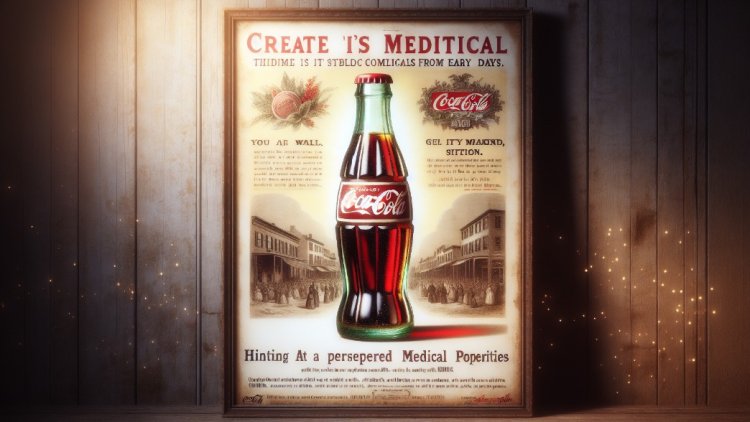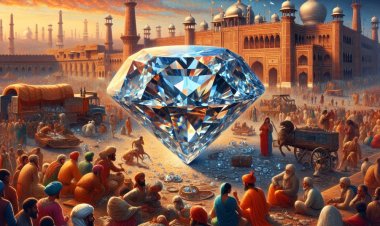The Disturbing Truth Behind Coca-Cola's Empire
"Uncover 'The Disturbing Truth Behind Coca-Cola's Empire,' a revealing exploration into the lesser-known aspects of the iconic brand's global dominance. This article delves into controversial practices, environmental impacts, and ethical challenges that shadow the world's most famous soft drink company."

Introduction
Coca-Cola, one of the most recognized brands in the world, has built its empire through a powerful advertising strategy. The company spends billions of dollars each year to sell an idea of happiness, harmony, and togetherness rather than simply promoting its products. However, behind their successful marketing campaigns lies a disturbing truth. Coca-Cola has faced numerous accusations, ranging from causing diseases and droughts to exploitation and more.
In this blog, we will delve into the fascinating history of Coca-Cola, spanning over three centuries, and explore how the company became a global powerhouse. We will examine the origins of the drink, its marketing tactics, and the controversies it has faced along the way. From the early days of patent medicines to the modern era of international expansion, Coca-Cola's story is both captivating and controversial.
Key Points:
-
Coca-Cola's advertising strategy focuses on selling an idea rather than just its products.
-
The company has faced accusations of causing diseases, droughts, and exploitation
-
This blog will provide an overview of Coca-Cola's history and explore the controversies surrounding the company
Coca-Cola's Origins
The creation of Coca-Cola can be traced back to the 1880s, when a man named John Pemberton, a war veteran and chemist, developed a drink called French Wine Coca. This beverage was initially a knockoff of another popular patent medicine called Vin Mariani, which contained a mix of wine and cocaine. However, when prohibition hit in 1885, Pemberton had to remove the wine from his drink and replace it with carbonated water. To counteract the bitter taste, he added a significant amount of sugar, and thus, Coca-Cola was born.
Coca-Cola's original formula included two main ingredients: the colonel, which contained caffeine, and the coca leaf, which contained cocaine. Despite the company's denial, historical evidence shows that the early recipes indeed contained cocaine. It wasn't until 1929 that Coca-Cola found a way to remove the active cocaine from the coca leaves.
In its early days, Coca-Cola was marketed as a medicinal product, claiming to be a harmless brain tonic that could relieve headaches and upset stomachs. However, sales were slow due to competition from other patent medicines. It wasn't until the company shifted its marketing strategy and positioned Coca-Cola as a tasty and relaxing drink for everyone that sales began to grow rapidly.
Coca-Cola's marketing tactics played a significant role in its success. The company invested heavily in advertising, paying movie stars and athletes to endorse the drink. They even featured Santa Claus in their holiday ads to create a connection between Coca-Cola and the joy of Christmas. Coca-Cola also used attractive women known as "Coca-Cola girls" to promote the brand, pioneering the use of sex appeal in advertising.
Coca-Cola's expansion into bottled drinks was another milestone in its history. Two lawyers approached the company with the idea of bottling Coca-Cola, and despite initial skepticism, a contract was signed. Bottled Coke became a massive success, allowing the company to reach a wider audience and increase sales. Over time, Coca-Cola's bottling operations expanded globally, with bottling plants set up in various countries, often funded by governments during World War II.
While Coca-Cola's origins are fascinating, the company has faced numerous controversies throughout its history. Accusations of causing diseases, water depletion, exploitation, and even collusion with Nazi Germany have marred its reputation. However, Coca-Cola's marketing prowess and ability to connect with consumers have helped it maintain its status as one of the most recognised brands in the world.
Asa Candler's Reign
Asa Candler, an aspirational businessman, purchased the company after the passing of John Pemberton, Coca-Cola's creator, in 1888. Candler wasted no time in taking control of the company and started implementing strategies to make Coca-Cola a household name.
Acquisition and marketing strategies
Asa Candler acquired the Coca-Cola company from Pemberton for $2,300 and began buying out other shareholders to gain full control of the company. He then focused on marketing and advertising to increase the sales and popularity of the beverage.
Candler's marketing strategy was revolutionary for its time. Instead of solely promoting Coca-Cola as a medicinal product, he positioned it as a tasty and relaxing drink for everyone to enjoy. This shift in marketing approach led to a rapid increase in sales and helped Coca-Cola stand out among its competitors in the patent medicine industry.
Candler invested heavily in advertising, paying movie stars and athletes to endorse the drink. Coca-Cola became synonymous with happiness and joy, thanks to its association with Santa Claus in holiday ads. The company also pioneered the use of sex appeal in advertising, featuring attractive women known as "Coca-Cola girls" to promote the brand.
The Introduction of Bottling
One of Candler's most significant achievements was the introduction of bottling for Coca-Cola. Two lawyers approached him with the idea, despite his initial scepticism. They offered to cover the costs and risks associated with bottling, and Candler agreed to grant them full bottling rights for just one dollar.
The decision to bottle Coca-Cola turned out to be a game-changer. Bottled Coke became a massive success, allowing the company to reach a wider audience and increase sales. Over time, Coca-Cola's bottling operations expanded globally, with bottling plants set up in various countries, often funded by governments during World War II.
Despite some legal disputes and issues with bottling contracts, the introduction of bottling played a crucial role in Coca-Cola's global expansion and its ability to cater to different markets.
Coca-Cola's Global Expansion
One of Coca-Cola's biggest strengths is its mass marketing strategy, which focuses on selling an idea rather than just the products themselves. By spending billions of dollars each year on advertising, Coca-Cola has become one of the most recognised brands in the world. Their campaigns promote the idea of happiness, harmony, and togetherness, creating a strong emotional connection with consumers.
During World War II, Coca-Cola's global expansion reached new heights. The company capitalised on the wartime sentiment and positioned itself as an essential product for soldiers. Coca-Cola successfully lobbied the US government for an exemption from sugar rationing, allowing them to continue producing their drink in abundance. The company even promised that every soldier would receive a bottle of Coca-Cola for just five cents, regardless of the cost to the company. This strategic move not only boosted morale among soldiers but also helped Coca-Cola spread its influence worldwide.
While Coca-Cola was supplying their product to the US military, they were also supplying Nazi Germany. This controversial decision allowed Coca-Cola to continue expanding its reach and revenue during the war. The company's bottling operations in Germany were used to distribute Coca-Cola and even featured the drink at Hitler Youth rallies. Despite claims of innocence and independence from Coca-Cola, these actions raised questions about the company's ethics and corporate responsibility.
Despite the controversies surrounding Coca-Cola's involvement with Nazi Germany and other ethical issues, the company's global expansion continued to thrive. During the war, governments frequently provided funding for the construction of Coca-Cola's bottling plants in various nations. This allowed Coca-Cola to establish a strong presence in new markets and reach a wider audience.
Today, Coca-Cola is sold in almost every country in the world, with only a few exceptions, such as Cuba and North Korea. The company's marketing prowess and ability to connect with consumers have played a significant role in its global success. However, it is important to acknowledge the controversies that have marred Coca-Cola's history and consider the wider implications of mass marketing and global expansion.
Controversies and ethical issues
Coca-Cola, despite its immense popularity and global presence, has faced a multitude of controversies and ethical issues throughout its history. These concerns range from health implications to advertising practices and environmental impacts. It is essential to examine these controversies to get a comprehensive understanding of the company's impact on society.
Health Concerns and Negative Effects of Coca-Cola
Coca-Cola's high sugar content has been a subject of concern. Studies have linked excessive consumption of sugary drinks, including Coca-Cola, to obesity, diabetes, and other health issues. Research has shown that even one extra sugary soft drink per day can increase the likelihood of becoming overweight. Additionally, the caffeine present in Coca-Cola raises questions about its impact on children and its addictive properties. These health concerns highlight the need for moderation and awareness when consuming Coca-Cola products.
Interference in Schools and Advertising for Children
Coca-Cola has faced criticism for its marketing tactics, especially when it comes to advertising to children. The company has been known to enter into exclusive contracts with schools, influencing the availability of other beverage options. The contracts often involve financial incentives, and schools are sometimes compelled to promote Coca-Cola products over healthier alternatives. Additionally, Coca-Cola's extensive advertising campaigns targeted at children have raised concerns about the influence of sugary drinks on young minds.
Environmental Impact and Water Usage
Another significant controversy surrounding Coca-Cola is its environmental impact and water usage. The company has bottling plants in drought-plagued areas, leading to accusations of depleting local water supplies. In some cases, Coca-Cola has been accused of polluting groundwater with wastewater, causing harm to local ecosystems and communities. Moreover, the company's massive demand for sugar and other natural resources raises questions about its sustainability practices and contributions to environmental degradation.
Despite these controversies and ethical issues, Coca-Cola's marketing prowess and emotional connection with consumers have helped maintain its status as one of the most recognised brands globally. It is crucial, however, to critically evaluate the wider implications of mass marketing and the impact of Coca-Cola's practices on health, children, and the environment.
The New Coke Disaster
In the history of Coca-Cola, one event stands out as a major marketing blunder: the introduction of New Coke. In the 1980s, Coca-Cola decided to change the formula of their iconic drink, which led to a significant consumer backlash.
Introduction of New Coke and Consumer Backlash
In an attempt to compete with rival Pepsi, Coca-Cola conducted blind taste tests and discovered a new formula that performed better than both the original Coke and Pepsi in these tests. With high hopes for the new product, Coca-Cola launched New Coke in 1985.
However, to the surprise and disappointment of Coca-Cola, the public response was overwhelmingly negative. Thousands of phone calls and letters flooded into Coca-Cola's offices, expressing outrage and demanding the return of the original formula.
Reintroduction of the Original Formula
Realising their mistake, Coca-Cola decided to bring back the original formula under the name "Classic Coke." This decision was met with immense praise and relief from customers. Coca-Cola's sales dramatically increased after reintroducing the original formula, with customers expressing their gratitude for listening to their feedback.
The Marketing Triumph of the Mistake
Despite the initial failure of New Coke, the entire episode turned into a marketing triumph for Coca-Cola. The public's strong emotional connection to the original formula was reignited, and their loyalty to the brand was strengthened.
It was a powerful reminder to Coca-Cola of the image they had created in people's minds—one of nostalgia, familiarity, and happiness. It demonstrated that the perception of the brand was more influential than the taste itself.
Through this mistake, Coca-Cola learned the importance of listening to their customers and preserving the image that they had carefully crafted over the years. The New Coke disaster remains a lesson in the power of brand loyalty and the impact of consumer feedback.
Conclusion
The power of Coca-Cola's brand image cannot be understated. Through its powerful advertising strategy, the company has successfully sold the idea of happiness, harmony, and togetherness to consumers around the world. This focus on selling an idea rather than just their products has helped Coca-Cola become one of the most recognised brands globally.
However, it is important to balance the positive aspects of Coca-Cola's brand image with the controversies the company has faced. Accusations of causing diseases, water depletion, exploitation, and even collusion with Nazi Germany have marred its reputation. These controversies raise questions about the ethics and corporate responsibility of the company.
Despite the controversies, Coca-Cola's brand image continues to have a significant influence on consumers. The company's marketing prowess and ability to connect with consumers have played a major role in its global success. The emotional connection that Coca-Cola has created with its consumers has helped it maintain its status as one of the most recognised brands in the world.
In conclusion, while Coca-Cola's brand image is powerful, it is important to consider the positive and negative aspects of the company's history. As consumers, it is essential to be aware of the influence and controversies surrounding Coca-Cola and make informed choices about the products we consume.



 admin
admin 










